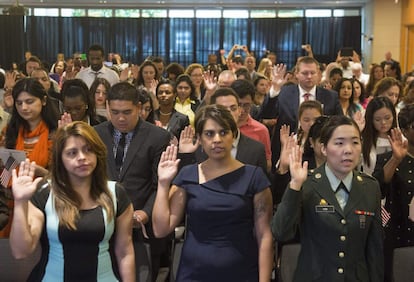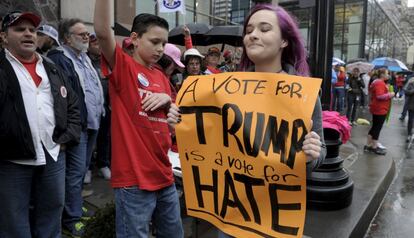‘Trump effect’ stirring massive mobilization of Latino voters
New initiatives show Hispanic community is reacting to magnate’s presidential bid


From the very first day that he launched his presidential campaign in June of last year, Donald Trump portrayed himself as tough on immigration and most particularly on Latinos.
His insults triggered a reaction by the Latino community, including an economic boycott against the business magnate.
The question was whether these acts would translate into a reaction at the polls if Trump were to become the Republican presidential candidate.
With primaries halfway decided in both parties, and four months to go before the final nominees are proclaimed, there are already some indications of the way things will go.
While it will still be months before any conclusive data emerges, there is a visible “Trump effect” that is mobilizing unprecedented numbers of Latinos in a common quest to vote and stop Trump on his road to the Oval Office.
Thanks to Trump, “the community’s courage is increasing,” says activist Sulma Arias
Last Thursday, several organizations working under the umbrella group Center for Community Change Action introduced a multimillion-dollar initiative to get Latinos to vote between now and November.
The project, which is coordinated through a super political action committee (Super PAC), will have an initial budget of $15 million to register minorities, especially Latinos, on the electoral rolls. Investors include the billionaire George Soros.
Sulma Arias, one of the coordinators of the project, says Trump “is the fuel that is going to fire up this machine.”
Efforts will focus on three swing states with significant Latino communities – Florida, Nevada and Colorado.
“The goal is to prove that as immigrants we are not going to tolerate the Republican Party’s rhetoric, and we are going to prove that in these three states we have the power to vote against those values,” says Arias in a telephone conversation from Washington.

Thanks to Trump, “the community’s courage is increasing,” she adds. “People are ready, but we need to channel that rage towards something positive. The message is that we need to go vote if we don’t want Donald Trump as president.”
It has become an accepted fact in US politics that Latinos have grown to be such a large group that, if they vote as one, they can decide an election. But that is not exactly the case. Latinos in general only mobilize at presidential elections, and it is hard to get them to do so at primaries or in more local elections. While voter turnout is in excess of 64% among whites and African-Americans, it is less than 50% among Latinos.
An estimated 27.3 million Latinos will have the right to vote at the next presidential election, four million more than in 2012. One of the reasons for the low turnout among Hispanic voters is that 44% of them are millennials, under-30s who tend to vote less than older people – one Latino turns 18 every 30 seconds. And the thing that worries Republicans the most is that the Trump effect may be reaching young Latinos as well.
An estimated 27.3 million Latinos will have the right to vote at the next election, four million more than in 2012
Last Wednesday morning, a group of students from the Alliance for Community Empowerment in Canoga Park, north of Los Angeles, took part in a discussion about Trump with EL PAÍS.
Around 90% of the students were Latinos – some US citizens, some not. Stephanie Tomasino, 24, said “Trump is ignorant and everyone who supports him is ignorant.”
Alexis Romo, 18, said on the contrary that “Trump is smart.”
“We criticize him, but what he does is working, because we let him do it. It’s not enough to sit and talk, we need to start a movement, “ he added.
“At my house we talk about politics a lot, and Trump scares my family,” said Danae Gallardo, 20, who has benefited from President Obama’s DACA deportation protection program.
Nélida de la Rosa, 20, added that Trump was “a hypocrite” because “his own family were immigrants.”
All the students said they wanted to vote for Bernie Sanders, or would if they could.
It seems that Donald Trump has managed to turn himself into a concern for young Latinos like perhaps no other presidential nominee ever before.
Growing numbers of youngsters are registering to vote and signing up as volunteer canvassers. This had never happened before” Mi Familia Vota director Ben Monterroso
Marta Segura is running for the California State Assembly for District 64, which includes some of the most underprivileged neighborhoods in Los Angeles, such as Watts, Compton and Wilmington.
Two decades ago, African-Americans were the predominant group here, but now it is Latinos. Segura is busy canvassing for votes among her neighbors these days, and has found an unprecedented ally in Trump.
“People are very worried about that,” she told EL PAÍS on Thursday following an event at the Latino Chamber of Commerce of Los Angeles. “They’re always making jokes about Trump. They have Trump piñatas at home.”
During her door-to-door campaigning in South L.A., she has run into undocumented parents who are encouraging their children to go vote: “People are mobilizing to ensure that Trump is stopped.”
Jorge Nuño, an entrepreneur and social organizer in South L.A., has noticed a similar situation. This week he started a campaign to get people signed up on the electoral rolls. He says that people are nervous about the idea of Trump in the White House. “People who had plans to buy a home are starting to hesitate, because Trump may be coming.”
One of the organizations with the greatest experience and national presence when it comes to encouraging Latinos to vote is Mi Familia Vota. Director Ben Monterroso says that “growing numbers of youngsters are registering to vote and signing up as volunteer canvassers. This had never happened before.”
The sad thing is that it took a Trump to get us to mobilize” Latino 24-year-old Ashley León
So far in this campaign, Monterroso has seen 30% increases in Latino voter registration compared with 2012. In Nevada, a key swing state that could go either way, and where Latinos represent a fifth of all voters, this increase has hit 60%. Monterroso has also seen immigrants who for years showed no interest in becoming US citizens, yet are now rushing to pledge allegiance to the Constitution in order to be able to vote in November. Anything to stop Trump.
“Definitely, at the national level we [Latinos] had never been attacked this way,” he adds. “It is a matter of concern that there has been no defense of immigrants by the Republican Party.”
Trump is not the Republican candidate yet. The more traditional sector of the Republican Party, the establishment, is promising to fight to the end to stop him. Its main fear is that Trump will trigger an unprecedented mobilization of minority voters and leave them out of the White House for four more years.
As 24-year-old Ashley León, of the Canoga Park center, put it: “The sad thing is that it took a Trump to get us to mobilize.”
English version by Susana Urra.
Tu suscripción se está usando en otro dispositivo
¿Quieres añadir otro usuario a tu suscripción?
Si continúas leyendo en este dispositivo, no se podrá leer en el otro.
FlechaTu suscripción se está usando en otro dispositivo y solo puedes acceder a EL PAÍS desde un dispositivo a la vez.
Si quieres compartir tu cuenta, cambia tu suscripción a la modalidad Premium, así podrás añadir otro usuario. Cada uno accederá con su propia cuenta de email, lo que os permitirá personalizar vuestra experiencia en EL PAÍS.
¿Tienes una suscripción de empresa? Accede aquí para contratar más cuentas.
En el caso de no saber quién está usando tu cuenta, te recomendamos cambiar tu contraseña aquí.
Si decides continuar compartiendo tu cuenta, este mensaje se mostrará en tu dispositivo y en el de la otra persona que está usando tu cuenta de forma indefinida, afectando a tu experiencia de lectura. Puedes consultar aquí los términos y condiciones de la suscripción digital.








































